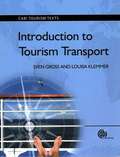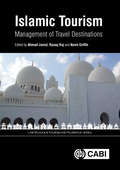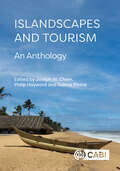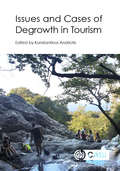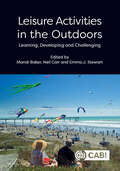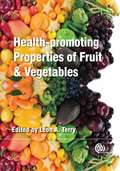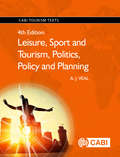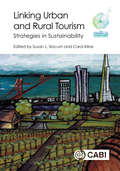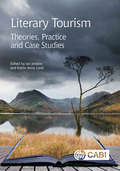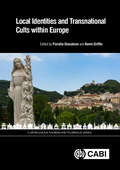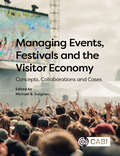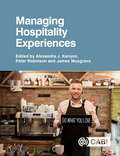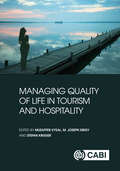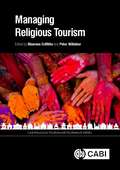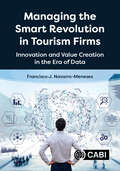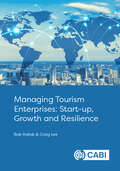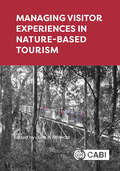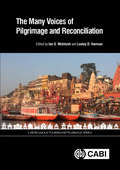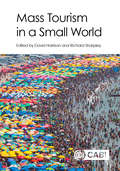- Table View
- List View
Introduction to Tourism Transport
by Sven Gross Louisa KlemmerTransport is an inherent part of tourism; whether as a functional means of transportation, such as between origin and destination or within the destination; or as a key element of the holiday experience itself, as in cruising or traveling along scenic or historic routes. This book provides the necessary background information to gain a comprehensive understanding of transportation markets, with each of the three modes of transportation - air, ground and marine - explored in detail. Each section includes definitions, the historical development of the market and international institutional frameworks, with case studies, learning objectives and study questions incorporated to facilitate an active learning process. View the free online resources for this book.
Islamic Tourism: Management of Travel Destinations (CABI Religious Tourism and Pilgrimage Series)
by Noha El-Bassiouny Rukeya Suleman Balal Qayum Yasin Bilim Ferdi Biskin Ibrahim Hakki Kaynak Sulistyo B. Utomo Professor Noel Scott Xin Jin Sorur Adwik Tahir Rashid Md Javed Kawsar Ibrahim Alsini Erdogan Ekiz Kashif Hussain Dr Tariq Elhadary Kristel Kessler Mustafa Acar Professor Alfonso Vargas-Sánchez María Moral-Moral Onur Akbulut Yakin Ekin Mustafa Yilmaz Ümit Sormaz Eda Günes Paolo Pietro Biancone Silvana Secinaro Dr Shin Yasuda UmmeSalma Mujtaba Dr Abdus Sattar AbbasiIslamic tourism is not purely motivated by religion; it also includes participants pursuing similar leisure experiences to non-Muslims, within the parameters set by Islam. Destinations are therefore not necessarily locations where Shari'a or full Islamic law is enforced. Demand for Islamic tourism destinations is increasing as the Muslim population expands, with the market forecast to be worth around US$238 billion. This book explores the ever-widening gap between the religious, tourism, management and education sectors. It provides practical applications, models and illustrations of religious tourism and pilgrimage management from a variety of international perspectives, and introduces theories and models in an accessible structure. The book: - Includes a range of contemporary case studies of religious and pilgrimage activities. - Covers ancient, sacred and emerging tourist destinations. - Reviews new forms of pilgrimage, faith systems and quasi-religious activities. This book offers an engaging assessment of the linkages and interconnections between Muslim consumers and the places they visit. It provides an important analysis for researchers of religious tourism, pilgrimage and related subjects.
Islandscapes and Tourism: An Anthology
by Karl Agius Hokulani K. Aikau Susie Khamis Alexander Araya López Adam Burke Kaytee Canfield Colin Filer Simon Foale Jennifer Gabriel Vernadette Gonzalez Donald V.L. Macleod Rosario Navalón-García Dr Solene Prince Stephen Royle Michael Wood Keir J. ReevesThe links between islands and tourism, as sights of pleasure is embodied in the touristification of sun, sand and sea. Islandscapes are central to the tourist imaginaries that shape islands as touristified places - curated, designed and commodified for both mass tourism and more niche inclined versions. Yet while islands are parlayed for touristic pleasure seekers, islands are also home to longstanding communities that have variously battled with the tyranny of distance from metropolitan centres, as well as the everyday challenges of climate change effects, and benefitted from their isolation from modern-day pressures. To what extent are islandscapes resilient to rapidly changing utilities, significances and ways of life wrought by tourism expansion? The vulnerability-resilience duality remains firmly entrenched in the discourse on islands where tourism has become prominent. Although tourism provides some resiliency, overall, islandscapes remain subject to externally driven fast and slow change that exercises an overwhelming influence. This anthology of articles previously published in the journal Shima explores emergent themes that describe how island peoples adapt and respond in localised cultural islandscapes as a consequence of tourism expansion. It is aimed at researchers in island studies, tourism, sustainability, human geography, cultural studies, sociology and anthropology. The anthology will also be of interest to those with an abiding interest in the trajectories of islands and their peoples, particularly where tourism has come to shape islandscapes.
Issues and Cases of Degrowth in Tourism
by Konstantinos AndriotisDegrowth in tourism is the voluntary shift to rebuild destinations and local economies in a way in which consumption, production and the exploitation of resources are minimal. It looks to ensure that the direction of institutional changes and the orientation of technological development are controlled and in harmony with the environment. Degrowth involves people whose use of personal time enhances the richness of the tourism experience through travelling less frequently, more slowly and in a low carbon way; taking time to support the environment, the local economy and to explore the local culture. Despite the significant role degrowth can play in destination development, it has rarely been examined from a tourism studies perspective. This book takes steps to address the paucity of combined research on tourism and degrowth by presenting emergent knowledge and research on this increasingly important concept. The book: Outlines the core theme of degrowth from a tourism perspective. Contains content enriched with contributions from multi-disciplinary academics from around the world. Puts theory into practice via international case studies. Due to the multidisciplinary nature of the book, the contents will appeal to researchers and postgraduates studying tourism, environmental studies, geography, planning and development and other related disciplines.
Leisure Activities in the Outdoors: Learning, Developing and Challenging
by Mandi Baker, Neil Carr, Emma J. StewartThe benefits of being outdoors in a leisure context are widely acknowledged across a range of disciplinary perspectives (including tourism, therapeutics, education and recreation). These benefits include the development of: health and wellbeing; social skills; leadership and facilitation skills; personal, emotional and reflective abilities; confidence and identity creation. Drawing on a variety of perspectives, geographies and approaches, this book explores the opportunities that leisure in the outdoors provides for learning, developing and challenging. The authors in this collection challenge dominant discourses of outdoor leisure through their selection of outdoor activities, theoretical approaches and modes of representation. All offer fresh insights and thinking into how leisure in the outdoors can be understood. The book covers a range of outdoor conceptualisations that challenge the reader to think deeply and broadly about the common threads which bind the broad field of outdoor leisure together. The experiences explored in this book range from suburban outdoors to wild places, surfing to mindful reflection, and trail walking to Nordic skiing, and encompass a broad spectrum of people. This book will appeal to outdoor scholars from a variety of contexts, including recreation, tourism, and adventure. It provides: ·original and leading research across layers of meaning attributed to and drawn from leisure experiences in the outdoors; ·value in theorising the notions of outdoor experiences; ·a variety and scope of contexts and approaches for students to draw on when learning about the field of outdoor leisure.
Leisure, Sport and Tourism, Politics, Policy and Planning
by A. J. VealThis comprehensive, multi-disciplinary introduction to public policy and planning as carried out by governments and associated agencies covers the rights of the person as a citizen in terms of their needs and requirements for leisure, travel and sport, and the role of the state and market in meeting these needs. Expanded to include sport as a subject separate from leisure, this new edition of the successful Leisure and Tourism Policy and Planning also addresses the issues of climate change and global warming, which are crucial considerations for tourism planners and policymakers. It covers theoretical perspectives and practical guidelines for the application of a range of analytical techniques, and includes an extensive bibliography and questions and exercises for each chapter, making it an ideal text for students as well as practitioners.
Leisure, Sport and Tourism, Politics, Policy and Planning (CABI Tourism Texts)
by A.J. VealThe gap between theory and practice in the leisure, sport and tourism studies areas seems to have widened as scholars have become more specialized. Nevertheless, it is imperative that students be as familiar as possible with a wide range of social and political theory, and also be able to reconcile that knowledge with their own current and future roles as practicing professionals. A comprehensive, multidisciplinary approach to public policymaking and planning in the leisure, sport and tourism sectors, this book: - examines the theoretical issues underpinning public sector policymaking such as political ideologies, leisure wants, needs, demand and benefits, and human rights in leisure, sport, tourism and culture; - discusses the debates surrounding the role of the state versus market, and models of organizational decision-making; and - uses applied sections addressing strategic planning and performance evaluation to provide a link between theory and practical analytical techniques. As well as extensive updating of sources, this new edition examines such topics as libertarianism, theocracy, anti-establishment politics, and the concept of generations. A new chapter presents discussions of a number of 'issues and challenges' facing the leisure, sport and tourism sector. Introducing the subject for undergraduate and postgraduate students of leisure, sport and tourism, this book is also a useful addition to the shelf of any policy maker or practitioner within the industries.
Leisure, Sport and Tourism, Politics, Policy and Planning 4th Edition
by A. J. VealA comprehensive, multi-disciplinary approach to public policy making and planning in the leisure, sport, and tourism sectors, this book provides an introduction to the subject for undergraduate and postgraduate students. It examines the theoretical issues underpinning public sector policy making such as political ideologies, leisure wants, needs, demand, and benefits, and human rights in leisure, sport, tourism, and culture. Also discussing the debates surrounding the role of the state versus market and the models of organizational decision-making, it uses applied sections addressing strategic planning and performance evaluation to provide a link between theory and practical analytical techniques.
Linking Urban and Rural Tourism
by Susan L. Slocum Carol KlineDestinations rely on regional strategies to support and enhance the tourism product through regional partnerships and integration. Integrated tourism is defined as tourism that is explicitly linked to the economic, social, cultural, natural and human structures of the region in which it occurs. Integrated tourism has evolved to include numerous meanings and definitions, but generally includes a vertical business or industry approach. The first of its kind, this book applies a more inclusive approach to integration by providing insight into inclusive regional development strategies that support both the needs of urban and rural areas whilst enhancing the tourist experience, supporting the positive impacts of tourism and mitigating the negative. Regional studies tend to portray either an urban or rural focus without acknowledging that often these spaces constitute joint governance structures, similar historical and cultural roots, and economic dependencies. Sustainable tourism promotes sourcing locally, such as using rural agricultural products in urban tourism experiences. Furthermore, innovative rural marketing strategies linking tourism heritage, attractions, food and drink trails, and artisans with urban visitors are emerging. Including theoretical and applied research and international case studies, this will be a valuable resource to academics, students and practitioners working in tourism development and regional policy.
Linking Urban and Rural Tourism: Strategies in Sustainability
by Karla Boluk Roslynn Brain Professor Kelly Bricker Christina T. Cavaliere Dana Clark Kynda R. Curtis John D. Delconte Lauren Duffy Marika Gon Professor Andrew Holden Gyunghoon Kim Chantell LaPan Dominic Lapointe Katherine Lupton Leah Greden Mathews Robert Maitland Acha-Anyi Paul Nkemngu Christopher Proctor Alexis SolanoDestinations rely on regional strategies to support and enhance the tourism product through regional partnerships and integration. Integrated tourism is defined as tourism that is explicitly linked to the economic, social, cultural, natural and human structures of the region in which it occurs. Integrated tourism has evolved to include numerous meanings and definitions, but generally includes a vertical business or industry approach. The first of its kind, this book applies a more inclusive approach to integration by providing insight into inclusive regional development strategies that support both the needs of urban and rural areas whilst enhancing the tourist experience, supporting the positive impacts of tourism and mitigating the negative. Regional studies tend to portray either an urban or rural focus without acknowledging that often these spaces constitute joint governance structures, similar historical and cultural roots, and economic dependencies. Sustainable tourism promotes sourcing locally, such as using rural agricultural products in urban tourism experiences. Furthermore, innovative rural marketing strategies linking tourism heritage, attractions, food and drink trails, and artisans with urban visitors are emerging. Including theoretical and applied research and international case studies, this will be a valuable resource to academics, students and practitioners working in tourism development and regional policy.
Literary Tourism: Theories, Practice and Case Studies
by Bernadette Quinn Lénia Marques Nadzeya Charapan Anniken Greve Humberto Fois-Braga Dr Warwick Frost Dr Jennifer Laing Hanna Mikulich Madelene Blaer Kelley A. McClinchey Klaus Pfatschbacher Giulia Rossetti Alana N. Seaman Dr Anukrati Sharma Tom M.J. SintobinLiterary tourism is a nascent field in tourism studies, yet tourists often travel in the footsteps of well-known authors and stories. Providing a wide-ranging cornucopia of literary tourism topics, this book fully explores the interconnections between the written word and travel. It includes tourism stories using guidebooks, films, television and electronic media, and recognises that stories, texts and narratives, even if they cannot be classified as traditional travel writing, can become journeys in themselves and take us on imaginary voyages. Furthermore, the book: - Provides a grounding in the theoretical perspectives on literature and the tourist experience; - Explores practical applications of literary tourism, such as destination promotion and creation, responsible tourism and learning benefits; - Uses global case studies to study literary tourism in action. Appealing to a wide audience of different disciplines, it encompasses subjects such as business literary writing, historical journeys and the poetry of Dylan Thomas. The use of these different perspectives demonstrates how heavily and widely literature influences travel, tourists and tourism, making it an important read for researchers and students of tourism, social science and literature.
Local Identities and Transnational Cults within Europe (CABI Religious Tourism and Pilgrimage Series)
by Professor Fiorella Giacalone Kevin Griffin Alfonsina Bellio Riccardo Cruzzolin Paola De Salvo Laurent S. Fournier Etienne Guillaume André Julliard Tony Kiely Inga B. Kuzma Mathilde Lamothe Gaëlla Loiseau Daniele Parbuono Gianfranco SpitilliLocal-level pilgrimages, when based on strong expressions of faith, can have a much wider local, regional and international appeal. It has been estimated that pilgrims and religious tourists number around 330 million per year, meaning development of these faith identities can help drive destination visitation and regional development. This book explores the central role of ordinary people in the popularisation of faith-based practices, thus illustrating religious tourism as an expression of cultural identity. Focusing on the interrelationship of cultural groups and the overall formation of culture and society, this book: - Uses a range of multidisciplinary, sociological and ethnographic studies to illustrate the evolution of pilgrimage sites and saints. - Includes practical case studies and illustrations of religious tourism and pilgrimage development from a variety of international perspectives. - Provides a selection of discussion questions for each chapter, encouraging readers to engage with further study and investigation of these important issues. An invaluable review of cultural identity and faith, this book delivers to scholars, students and local policy makers a collection of current perspectives on the growth, development and evolution of faith practices surrounding contemporary and historical sites and saints.
Local Identities and Transnational Cults within Europe (CABI Religious Tourism and Pilgrimage Series)
by Alfonsina Bellio Riccardo Cruzzolin Paola De Salvo Laurent S. Fournier Professor Fiorella Giacalone Kevin Griffin Etienne Guillaume André Julliard Tony Kiely Inga B. Kuzma Mathilde Lamothe Gaëlla Loiseau Daniele Parbuono Gianfranco SpitilliLocal-level pilgrimages, when based on strong expressions of faith, can have a much wider local, regional and international appeal. It has been estimated that pilgrims and religious tourists number around 330 million per year, meaning development of these faith identities can help drive destination visitation and regional development. This book explores the central role of ordinary people in the popularisation of faith-based practices, thus illustrating religious tourism as an expression of cultural identity. Focusing on the interrelationship of cultural groups and the overall formation of culture and society, this book: - Uses a range of multidisciplinary, sociological and ethnographic studies to illustrate the evolution of pilgrimage sites and saints. - Includes practical case studies and illustrations of religious tourism and pilgrimage development from a variety of international perspectives. - Provides a selection of discussion questions for each chapter, encouraging readers to engage with further study and investigation of these important issues. An invaluable review of cultural identity and faith, this book delivers to scholars, students and local policy makers a collection of current perspectives on the growth, development and evolution of faith practices surrounding contemporary and historical sites and saints.
Managing Events, Festivals and the Visitor Economy: Concepts, Collaborations and Cases
by Barry Ardley Marie Avellino Andrea Barber Lino Briguglio Ning Chris Chen Alan Fyall Simon Gerard Werner Gilde Claudia Green Elizabeth Halpenny Dr Marcus Hansen Tadayuki Hara Miles Hedison Abigail Hunt Professor Maximiliano Korstanje Dr Anna Leask Anle Li Leonie Lockstone-Binney Kim Macmillian Judith Mair Anthony May Yong Rao Martin Robertson Mostafa Selima Hugues Seraphin Nick Taylor Gabriel Marin Vendenbroucke Richard Voase Kenneth Wardrop Desmond Wee Nanxi YanThis edited text, intended to support a research-informed approach to learning and teaching, presents an array of concepts, collaborations and in-depth cases related to managing events, festivals and the visitor economy. Authors offer an array of philosophical, political, cultural, and ethical perspectives on how to achieve this across a range of contexts, from Cambodia, China, Egypt to the British cathedral city of Lincoln. Though recognising individual difference, each chapter unites in their common pursuit of supporting the United Nations Sustainable Development Goals (UNSDGs). This is significant as utilising the UNSDGs as a normative organising framework for how we all think about, plan, and manage a 'good' visitor economy is increasingly ubiquitous. It is with this in mind that each chapter provides explicit links to the UNSDGs and policy and/or practical implications, along with a series of critical self-assessment questions to reflect on the chapter's key arguments. This collection aims to satiate what appears to be an increasing appetite of readers and students alike who seek exposure to rigorous debate in and out of the classroom.
Managing Hospitality Experiences
by Adenike Adebayo Rudin Beka Kevan Burke Sandra J Cooper Peter Cox Martin Hilton James Musgrave Ade Oriade Josephine Pryce Lucy Hack Alexandra Kenyon Roya Rahimi Dr Peter Robinson Gonzalo Díaz MenesesManaging hospitality experiences is a crucial part of the hospitality business and industry alike. While many textbooks cover the management of hospitality services, this text focuses specifically on experiences, while also providing a full and detailed insight into the ways in which experiences are designed and delivered. Using examples from the gamut of hospitality, this book explores issues around people, services and spaces. It covers management issues such as marketing, human resources, operations, quality management, facilities management, project management and strategy, while considering hospitality operations within their wider geo-social and geo-environmental settings. This book includes a range of important contemporary topics, such as sustainability, resilience and ethics; supported throughout by learning objectives, case studies, review questions, links to videos and further reading suggestions. This book: Emphasises experiences within hospitality, providing students with a focused and applicable text. Includes numerous international industry case studies to illustrate how hospitality organisations manage experiences; these real-life scenarios provide key teaching points. Provides wider theoretical principles to develop the field of hospitality and place it within an industry context. An invaluable read for undergraduate students of hospitality and event management, this textbook also provides an overview for postgraduate students and those studying further education courses in hospitality and related areas.
Managing Quality of Life in Tourism and Hospitality: Best Practice
by Muzaffer Uysal M. Joseph Sirgy Dr Stefan KrugerQuality-of-life research in tourism and hospitality has gained much momentum in the past two decades. This line of research covers three main areas of focus: (i) the impacts of specific tourism and hospitality programmes on the overall quality of life of tourists/guests; (ii) the providers of goods and services; (iii) tourist communities, including the impact of different programmes and events on the quality of life of residents in these communities. Focusing on these key subjects, Managing Quality of Life in Tourism and Hospitality provides a portfolio of selected cases showing best practice and delivering them to the forefront of knowledge application, with examples in tourism and hospitality settings. Best practice case studies are included throughout, providing practical implications and lessons learned. These lessons can be applied by tourism and hospitality practitioners and community leaders, and be used to further research by academics working within tourism and hospitality. The book offers an exciting and refreshing approach to quality-of-life research in tourism and hospitality. Key features include: - Best practice and evidence-based case studies. - Broad coverage that includes tourists, industry and local communities. - International application, with material from various countries across the world.
Managing Quality of Life in Tourism and Hospitality: Best Practice
by Muzaffer Uysal M. Joseph Sirgy Stefan KrugerQuality-of-life research in tourism and hospitality has gained much momentum in the past two decades. This line of research covers three main areas of focus: (i) the impacts of specific tourism and hospitality programmes on the overall quality of life of tourists/guests; (ii) the providers of goods and services; (iii) tourist communities, including the impact of different programmes and events on the quality of life of residents in these communities. Focusing on these key subjects, Managing Quality of Life in Tourism and Hospitality provides a portfolio of selected cases showing best practice and delivering them to the forefront of knowledge application, with examples in tourism and hospitality settings. Best practice case studies are included throughout, providing practical implications and lessons learned. These lessons can be applied by tourism and hospitality practitioners and community leaders, and be used to further research by academics working within tourism and hospitality. The book offers an exciting and refreshing approach to quality-of-life research in tourism and hospitality. Key features include: - Best practice and evidence-based case studies. - Broad coverage that includes tourists, industry and local communities. - International application, with material from various countries across the world.
Managing Religious Tourism (CABI Religious Tourism and Pilgrimage Series)
by Dr Maureen Griffiths Peter Wiltshier Silvia Aulet Dr Lucrezia Lopez Xosé M. Santos Dr Elisa Piva Stefania Cerutti Razaq Raj Dane Munro Ian Rotherham Nigel Morpeth Alan Clarke Dr Maaike De Jong Dr Alexander Grit Rong Huang Xin Lei Hu Kevin Griffin Vreny Enongene Sonia Puyol Ramon Canal Esperanca Holgado Dr Daniel H OlsenManaging Religious Tourism provides a global view of the tools and resources used in demand and supply management, in the context of pilgrimage and religious tourism. With a focus on toolkits and best practices, the book reinforces the quality of service provision and offers a reflection on consumers' perspectives and what drives their purchasing decisions with regards to a variety of destinations. These central themes are complemented by an understanding of management responses to consumer behaviour and mobility, accessibility, individualism and tourism for both sacred and secular purposes. The book also examines the ways in which networks, partnerships and the conceptual stakeholder approach can be employed by religious tourism suppliers working with destination management organisations. The text promotes sustainable development and a triple bottom line focus, with all chapters supporting policy for framing development. Key features include: - Global perspective on tools as well as management approaches and techniques. - Emphasis on sustainability in connecting sacred and secular consumers. - Focus on promoting learning and development within this important tourism sector.
Managing Religious Tourism (CABI Religious Tourism and Pilgrimage Series)
by Silvia Aulet Dr Lucrezia Lopez Xosé M. Santos Dr Elisa Piva Stefania Cerutti Razaq Raj Dane Munro Ian Rotherham Nigel Morpeth Alan Clarke Dr Maaike De Jong Dr Alexander Grit Rong Huang Xin Lei Hu Kevin Griffin Vreny Enongene Sonia Puyol Ramon Canal Esperanca Holgado Dr Daniel H OlsenManaging Religious Tourism provides a global view of the tools and resources used in demand and supply management, in the context of pilgrimage and religious tourism. With a focus on toolkits and best practices, the book reinforces the quality of service provision and offers a reflection on consumers' perspectives and what drives their purchasing decisions with regards to a variety of destinations. These central themes are complemented by an understanding of management responses to consumer behaviour and mobility, accessibility, individualism and tourism for both sacred and secular purposes. The book also examines the ways in which networks, partnerships and the conceptual stakeholder approach can be employed by religious tourism suppliers working with destination management organisations. The text promotes sustainable development and a triple bottom line focus, with all chapters supporting policy for framing development. Key features include: - Global perspective on tools as well as management approaches and techniques. - Emphasis on sustainability in connecting sacred and secular consumers. - Focus on promoting learning and development within this important tourism sector.
Managing the Smart Revolution in Tourism Firms: Innovation and Value Creation in the Era of Data
by Dr Francisco Navarro-MenesesSmart Technologies are revolutionizing tourism, as they promise to change the way tourists behave and how companies interact with them and generate profits. The increasing availability of real-time data in combination with advanced machine learning techniques, artificial intelligence and business analytics, to name but a few, will transform the tourism industry forever and in unthinkable ways. The degree of sophistication achieved by Smart Technologies and the speed with which transformations are taking place means that those people lacking a relevant digital background may lag behind, therefore being unable to take advantage of the opportunities offered by the data economy and fully benefit from its applications. This practical book explains the key ideas that tourism practitioners and decision-makers must know to understand Smart Technologies, and the management principles supporting them. The contents: · Include real-life cases to illustrate to the reader the true dimension of the "smart" phenomenon and the new frontiers that are yet to open in the coming years · Bring together the knowledge and experience of leading experts from the academia, tourism sector and technology companies, who reveal, in a unified way, the fundamental points your organization must consider in the path towards being smarter · Create a practical knowledge tool that allows getting the most out of Smart Technologies, its products and future trends, while learning how to make them a competitive tool, and avoid being left behind · Features full colour figures and photographs The book will be a vital resource for Tourism practitioners, strategic planners and policy makers as well as students of tourism marketing, management and technology
Managing Tourism Enterprises: Start-up, Growth and Resilience
by Dr Rob Hallak Dr Craig LeeManaging Tourism Enterprises: Start-up, Growth and Resilience brings a new contribution to the literature on tourism management. It presents a comprehensive, educational text on the initiation, management, growth, performance and resilience of tourism enterprises in the age of digital disruption and global uncertainty. The book addresses the unique characteristics of tourism enterprises, how they are created, how they are managed, the factors that drive business performance, and how they must be innovative, resilient and adaptable in order to succeed. The content draws on empirical research, grey literature, government data and case studies to present theoretical and practical knowledge on the successful management of tourism enterprises and their role in tourism destinations. This book describes and includes essential business planning and teaching tools, such as: · The feasibility analysis, marketing plan, and strategic planning tools. · Lecture slides for each chapter. · Case studies with discussion questions. This is an essential book for undergraduate students completing 2nd and 3rd year courses on tourism management, with a focus on managing tourism enterprises; and postgraduate students undertaking courses specific to strategy and performance of tourism firms.
Managing Visitor Experiences in Nature-based Tourism
by Ali Thompson Mick Abbott Karl Agius Mary E. Allen George Ariya Rocío Blanco-Gregory Cameron Boyle Robert C. Burns Kadir Çakar Eugenio Conti Fernando Enseñat-Soberanis Sonia Ferrari Peter Fredman Azizul Hassan Stuart Hayes Nicolaia Iaffaldano Woody Lee Tiago Lopes Brent Lovelock Andrés Ried Luci Lusine Margaryan Johnathan Mondragón-Mejía Ana Goytia Prat Haywantee Ramkissoon Francisco Silva Jeffrey C. Skibins Ismail UzutThis book focuses on the experiences of tourists visiting nature-based destinations, exploring current knowledge and providing insights into conceptual issues through the use of empirical evidence from five continents. Presented as three topics, the contents discuss tourism and nature-based experiences by looking at the role and relevance of nature and the uniqueness of such experiences. The book identifies visitor management challenges and provides explanations for the solutions reached. The final section takes a more overarching destination management perspective that transcends the tourism product or business level and focuses on destination and generic issues like indicators or marketing implications. The book also includes research-based case studies which contribute to an overall understanding of the core issues involved in managing visitor experiences in nature-based tourism.
The Many Voices of Pilgrimage and Reconciliation
by Ian S. McIntosh Lesley D. HarmanReviewing peace and reconciliation, secular pilgrimages, and international perspectives on sacred journeys, this book offers the reader an opportunity to encounter multiple voices and viewpoints on one of the most ancient practices of humankind. With an estimated third of all international travellers now undertaking journeys anticipating an aspect of transformation (the hallmark of pilgrimage), this book includes both spiritual and non-spiritual voyages, such as journeys of self-therapy, mindfulness and personal growth. It also: - Provides a multidisciplinary perspective, covering themes such as gender, human rights, equality, the environment, peace, history, literature, and politics - Reflects the rich diversity and multiple meanings of pilgrimage through an international writer team spanning four continents - Includes case studies of pilgrimage in action from around the world An innovative and engaging addition to the pilgrimage literature, this book provides an important resource for researchers of religious tourism and related subjects.
Many Voices of Pilgrimage and Reconciliation, The (CABI Religious Tourism and Pilgrimage Series)
by Tahar Abbou Lucinda Carspecken John Hornblow Jenny Boyack Sonika Jain Nanna Natalia Jørgensen Steven Muir Zülfükar Özdogan Cindy Pavlinac E. Moore Quinn Mari-Johanna Rahkala-Simberg Varada Sambus Patricia A. Sayre Daniel J. Simons Chadwick Co Su Sara TerreaultReviewing peace and reconciliation, secular pilgrimages, and international perspectives on sacred journeys, this book offers the reader an opportunity to encounter multiple voices and viewpoints on one of the most ancient practices of humankind. With an estimated third of all international travellers now undertaking journeys anticipating an aspect of transformation (the hallmark of pilgrimage), this book includes both spiritual and non-spiritual voyages, such as journeys of self-therapy, mindfulness and personal growth. It also: - Provides a multidisciplinary perspective, covering themes such as gender, human rights, equality, the environment, peace, history, literature, and politics - Reflects the rich diversity and multiple meanings of pilgrimage through an international writer team spanning four continents - Includes case studies of pilgrimage in action from around the world An innovative and engaging addition to the pilgrimage literature, this book provides an important resource for researchers of religious tourism and related subjects.
Mass Tourism in a Small World
by Dr Hazel Andrews Julio Aramberri Dr Gregory Ashworth Raoul Bianchi Sue Bleasdale Professor Kelly Bricker Jim Butcher Erik Cohen David Duvall Martin Farr John Heeley Professor Andrew Holden Dr Stanislav Ivanov Heather Jeffrey Gabriele Manella Professor Chris Ryan Asterio Savelli Hongdi Shen Dr John E Tunbridge Professor David Weaver Dr Paul F WilkinsonThis book reviews all aspects of the phenomenon of mass tourism. It covers theoretical perspectives (including political economy, ethics, sustainability and environmentalism), the historical context, and the current challenges to domestic, intra-regional and international mass tourism. As tourism and tourist numbers continue to grow around the world, it becomes increasingly important that this subject is studied in depth and best practice applied in real-life situations. This book: - Is the first to address a range of theoretical issues relating to mass tourism; - Uses a wide selection of case studies to translate theory into practice, covering the historical rise and fall of UK seaside resorts, the increase in Chinese tourism, conflict between different mass tourism groups, destination transformation from mass to niche tourism, and specific problems facing cruise ships; - Is written by a range of international, established authors to give a global perspective on the subject. Finishing with a speculative chapter identifying potential future trends and challenges, this book forms an essential resource for all researchers and students within tourism studies.
